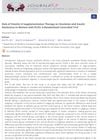 2 citations,
May 2006 in “Women's Health Medicine”
2 citations,
May 2006 in “Women's Health Medicine” PCOS is diagnosed when at least two of these three features are present: polycystic ovaries, irregular ovulation, and high androgen levels.
 991 citations,
January 2011 in “Nature Reviews Endocrinology”
991 citations,
January 2011 in “Nature Reviews Endocrinology” The document concludes that PCOS is a complex disorder caused by both genetic and environmental factors, affecting women's health in various ways, and requires personalized treatment.
 December 2022 in “OBG Management”
December 2022 in “OBG Management” The conclusion is to diagnose PCOS with just hyperandrogenism and irregular periods, and treat with lifestyle changes and basic medications.

Polycystic ovary syndrome (PCOS) affects about 10% of women, is often linked to obesity and family history, and can cause irregular periods, fertility issues, and other symptoms. It's usually managed with lifestyle changes, weight loss, and medication.
 October 2021 in “Journal of Advanced Biomedical and Pharmaceutical Sciences”
October 2021 in “Journal of Advanced Biomedical and Pharmaceutical Sciences” Vitamin D helps improve PCOS by aiding insulin function and ovarian health.
 2 citations,
January 2017 in “Cambridge University Press eBooks”
2 citations,
January 2017 in “Cambridge University Press eBooks” Manage PCOS in primary care with weight loss, psychological support, medication, and monitoring for health risks.
 38 citations,
May 2006 in “Archives of Gynecology and Obstetrics”
38 citations,
May 2006 in “Archives of Gynecology and Obstetrics” Women with only irregular periods or excess hair have a better hormone profile than those with full PCOS, but both groups are similar, indicating a need for better PCOS diagnosis methods.
 March 2019 in “Evidence Based Women Health Journal (Online)”
March 2019 in “Evidence Based Women Health Journal (Online)” Vitamin D supplements increased ovulation rates in women with PCOS who were vitamin D deficient.
 4 citations,
May 2024 in “The Lancet”
4 citations,
May 2024 in “The Lancet” Bariatric surgery improves ovulation rates in women with PCOS and obesity better than medical therapy.
 47 citations,
August 2000 in “Endocrine Reviews”
47 citations,
August 2000 in “Endocrine Reviews” The document concludes that more research is needed to understand excessive hair growth in women with normal hormone levels and regular ovulation.
 July 2019 in “International journal of reproduction, contraception, obstetrics and gynecology”
July 2019 in “International journal of reproduction, contraception, obstetrics and gynecology” Obesity greatly affects polycystic ovarian syndrome, and losing weight should be the first treatment for obese patients to improve their chances of ovulation and pregnancy.
 99 citations,
August 2003 in “Fertility and Sterility”
99 citations,
August 2003 in “Fertility and Sterility” Too much male hormone is the main cause of Polycystic Ovary Syndrome.
 9 citations,
January 2015 in “Springer eBooks”
9 citations,
January 2015 in “Springer eBooks” The document concludes that managing PCOS involves treating symptoms, regulating periods, and reducing health risks, with specific medications for fertility and metabolic issues.
 October 2010 in “Cambridge University Press eBooks”
October 2010 in “Cambridge University Press eBooks” Lifestyle changes like diet and exercise are key for treating overweight women with polycystic ovary syndrome.
 1514 citations,
December 2011 in “Fertility and sterility”
1514 citations,
December 2011 in “Fertility and sterility” Experts agree that PCOS affects women's health in complex ways, but more research is needed to understand and treat it effectively.
 257 citations,
July 2018 in “Obstetrics & Gynecology”
257 citations,
July 2018 in “Obstetrics & Gynecology” PCOS is a complex disorder in women that can lead to various health risks and requires personalized treatment.
 5 citations,
October 2012 in “Journal of Midwifery & Women's Health”
5 citations,
October 2012 in “Journal of Midwifery & Women's Health” Healthcare providers should start with simple fertility tests and treatments before referring patients to specialists.
 April 2024 in “Canadian Women s Health Today”
April 2024 in “Canadian Women s Health Today” PCOS treatment focuses on lifestyle changes and specific medications to manage symptoms and complications.
 May 2010 in “Current Women's Health Reviews”
May 2010 in “Current Women's Health Reviews” The document concludes that early diagnosis and treatment of PCOS in teenagers is important for managing symptoms and preventing long-term health problems.
 16 citations,
March 2011 in “Pediatric diabetes”
16 citations,
March 2011 in “Pediatric diabetes” Metformin helps manage diabetes, PCOS, and weight in kids but needs more research for long-term safety.
 1540 citations,
October 2008 in “Fertility and Sterility”
1540 citations,
October 2008 in “Fertility and Sterility” The report concludes that PCOS is mainly a condition of excess male hormones and its definition may change as new information is discovered.
 286 citations,
January 2009 in “Human Reproduction Update”
286 citations,
January 2009 in “Human Reproduction Update” Women with the NIH type of PCOS have more obesity and higher risk of diabetes and heart disease than those with other types of PCOS.
 18 citations,
December 2014 in “Obstetrics and Gynecology Clinics of North America”
18 citations,
December 2014 in “Obstetrics and Gynecology Clinics of North America” Losing 5-10% body weight can improve PCOS symptoms, letrozole is better than clomiphene for fertility, and managing weight and blood sugar is important to reduce pregnancy complications.
 1 citations,
June 2012 in “Springer eBooks”
1 citations,
June 2012 in “Springer eBooks” Acupuncture may improve reproductive and metabolic functions in PCOS without negative side effects, but more research is needed to confirm its effectiveness.
 March 2023 in “Scholars international journal of obstetrics and gynecology”
March 2023 in “Scholars international journal of obstetrics and gynecology” PCOS is a complex condition that affects women's hormonal balance and metabolism, requiring lifestyle changes and medical management.
 November 2018 in “International Journal of Current Pharmaceutical Research”
November 2018 in “International Journal of Current Pharmaceutical Research” PCOS is a hormonal disorder causing symptoms like irregular periods and acne, and increases the risk of diabetes and heart disease.
 68 citations,
January 2022 in “International Journal of Molecular Sciences”
68 citations,
January 2022 in “International Journal of Molecular Sciences” PCOS management includes lifestyle changes and medications, with ongoing research into repurposed drugs for better treatment options.
 May 2023 in “Metabolites”
May 2023 in “Metabolites” Myo-inositol plus α-lactalbumin works better than myo-inositol alone for improving symptoms of PCOS.
 July 2021 in “International Journal of Homoeopathic Sciences”
July 2021 in “International Journal of Homoeopathic Sciences” Certain factors can trigger hormonal imbalances and cyst formation, leading to Polycystic Ovarian Syndrome (PCOS).

Nanotechnology improves Clomiphene citrate's effectiveness and reduces side effects for treating ovulatory disorders.






























